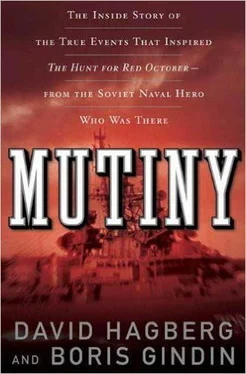Of course if it’s one of the alternate Mondays the officer will have to take his crew up to their cubrick and teach them about Marx and Lenin and how the great Soviet experiment is a model for all mankind. It doesn’t matter if the men had worked nonstop their entire shift and are filthy dirty, covered in oil and grease, and just want to get a little sleep; Marx and Lenin come first.
The worst part is when Potulniy decides that he wants to conduct a uniform inspection on deck. It’s usually on these occasions when, covered in oil, Boris is rushing to his sailors’ cubricks to make sure that they are cleaned up and their uniforms are in order and ready for inspection that he runs into a fellow officer, all spick-and-span.
“So, Boris, how is it going, then?” the officer asks sarcastically, knowing full well exactly how it’s going. He’s been there himself before and will probably be in the same spot again before long. It’s just a little joke they have with each other. “Poshel na khyi” (go fuck yourself), Boris says tiredly but good-naturedly.
During the shift, nothing at all might happen, except that his sailors will check the gauges and log the readings every hour. Especially the late-night and early-morning shifts. If nothing goes wrong with the equipment and the bridge does not ring for a change in the RPMs, Gindin and his crew might actually catch a few minutes of sleep now and then. Or maybe some of his more inventive crew might find a diversion, like stealing potatoes and cooking them. Or stealing some of the spirt they are supposed to use to clean equipment and hiding it in a fire extinguisher. Every now and then on their off-duty time, if Boris isn’t watching, they might pause in front of the fire extinguisher for just a second. Plenty of time for a little sip. Makes a night pass a little faster.
Besides making sure that his sailors are doing their jobs, Boris has his own rounds every hour, during which he listens to each turbine using what amounts to a stethoscope to make sure nothing inside the engines is starting to go bad.
Smoking isn’t allowed in the engine room, so from time to time one of the other off-duty officers will stop by to relieve Boris for a few minutes. He goes up on deck and grabs a quick smoke. From time to time he returns the favor. It’s another of the military systems that are not in the regulations but seem to work just fine.
Then there is the almost continuous training. It’s up to Gindin to make sure all the sailors in his section know their jobs. That means, besides maintaining the gas turbines and other equipment, he has to take each of his sailors step-by-step through every single procedure from starting the engines to shutting them down and everything in between. That also means that Boris must intimately know every single nut, bolt, lever, and knob, shaft and gear in his entire section. It’s a very important responsibility that Boris has taken to heart from the day he graduated from the academy. His job is 24/7, and besides teaching his sailors he keeps himself up-to-date.
Other than Captain Potulniy, Boris Gindin probably knows the ship better than anyone else aboard.
There is perhaps a little fog beginning to form along the Daugava River, curling in wispy tendrils in and among the warships at anchor. Elsewhere in the assembled fleet sailors and officers not on duty are relaxing in their cubricks or cabins, maybe reading or watching television in one of the dining halls. This is the Gulf of Riga, on the same latitude as northern Newfoundland, protected from the open Baltic Sea only by the island of Saaremaa, so it is a very cold place in November. This is not Gindin’s home, and there have been times since his father’s death, like right now, that Boris feels a crushing sense of loneliness. He wants to get this meeting over with, he wants to get the Storozhevoy to the shipyard for his refit, he wants to sail back to base, and then he wants to spend some time with his mother and sister and other relatives. Then, if everything goes as he hopes it will, he will get the shoreside job that Potulniy has promised to help with, so that he can find a wife, settle down, have children, and get on with the rest of his life.
It’s a happy prospect for him, yet he cannot shake the sense of doom that has been riding over his shoulder like a mid-Atlantic squall ready to pounce.
The windowless midshipmen’s dining hall with fluorescent lights casting a sickly flat light is on the starboard side, just aft of the flaring bow. It’s a plain, dull compartment with no pictures on the pale green walls and linoleum on the steel deck. Two long dining tables, with gray plastic covers, seat three or four in chairs along one side and, curiously, sofas with dark blue covers on the other. A small plastic table with a brown plastic bin is positioned on the left side of the room, and in the center is another small table where Sablin is standing in his uniform. Along the back wall is a tiny room that holds the movie projector.
“Comrades, take a seat, please,” Sablin tells the officers as they shuffle in. Perhaps he is stepping nervously from foot to foot.
There are fourteen of them, but the tables are only meant to seat twelve, so they have to crowd together. Gindin figures it doesn’t really matter, hoping they’ll be out of here and back to their quarters in a few minutes, maybe a half hour.
“We ought to have a few drinks tonight,” Firsov says, sitting down with his roommate. “Proshutinsky was right: You’ve got enough spirt to go around.”
“We’ll see when we get done with this stupid meeting,” Gindin replies half under his breath. He looks over his shoulder as the last of the officers come in. “Where’s the captain?”
“He’ll be here,” Firsov says.
Everyone is talking at once, ignoring the zampolit. Yesterday was a holiday and no one is in a mood to listen to what is probably going to be another patriotic speech about serving the great Soviet people.
Sablin holds up a hand. “Settle down, please. This is important.”
“Pardon me, Comrade Sablin,” Gindin speaks up. “Where is the captain?”
“Stop talking now, so we can get on with this meeting,” Sablin says.
Gindin looks over his shoulder just as Alexander Shein, one of the ratings, closes the door on them. Their eyes meet for just a moment, but then Shein slips into the projection booth and closes that door. “What the hell—?”
“What’d you say?” Firsov asks.
“That was Shein. He’s in the projection room.”
Firsov glances over his shoulder at the door, a look of puzzlement on his face. “What the hell are you talking about? What’s he doing here?”
“I don’t know,” Gindin says, but his stomach is doing a slow roll.
Every sailor aboard is assigned a duty area that he has to keep clean. Shein’s duty area includes Gindin’s and Firsov’s cabin. He did his job without complaining, but he’s also struck Gindin as being a little bit sneaky. The other sailors are watching a movie in their own dining hall, so what is Shein doing up here, closing the door and hiding in the projection room?
No one else has noticed, but gradually the other men begin to settle down, until finally the dining hall is quiet.
“To answer your question, Lieutenant, Captain Potulniy is in his quarters resting,” Sablin says. He isn’t smiling, like usual. “In fact, he told me that I was to conduct this meeting and he did not want to be bothered.”
“Why is the door closed?”
Sablin shrugs indifferently. “So we will not be disturbed, Lieutenant.” He looks at the others crammed together at the tables. “What I have to say to you tonight is very important; I want you to know that from the start.”
Читать дальше












